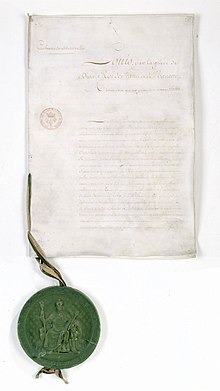1814 Charter
| Charter of 1814 | |
|---|---|

Charter of 1814.
|
|
| Original title | (in French) Charte constitutionnelle du 4 juin 1814 |
The French Charter of 1814 was a constitution granted by King Louis XVIII of France shortly after his restoration. The Congress of Vienna demanded that Louis bring in a constitution of some form before he was restored.
The opening twelve articles of the Charter are analogous to a 'Bill of Rights'. They contained such measures as a declaration of equality before the law, due process rights, religious toleration, freedom of the press, protection of private property, abolition of conscription. These principles, together with the retention of the Napoleonic Code, represent some of the permanent gains of the French Revolution.
Nevertheless, the concept of the judicial review of the constitutionality of legislation was undeveloped, and it was the responsibility of the legislature, not the courts, to defend these rights. Freedom of the press, in particular, was subsequently restricted by harsh press censorship laws, which were deemed to violate the spirit of the charter.
Moreover, religious toleration was limited by the special provision made for the Catholic Church as the official state religion.
The King occupied a central position under the Charter of 1814.
The Charter declared that the king was Head of State and chief executive: the King appointed public officials, issued the ordinances and regulations necessary 'for the execution of the laws and the security of the state', commanded the army and navy, declared war, and made 'treaties of peace, alliance and commerce' (Articles 13 and 14).
In addition, the King had great influence over the legislative power, since he possessed the sole right to present draft laws to Parliament (Article 16), and the right to grant or withhold assent to laws passed by the Parliament (Article 20). The King summoned and prorogued Parliament and had the right to dissolve the Chamber of Deputies and call new elections (Article 50) . The King also appointed the members of the House of Peers (Article 27).
In the judicial field, the King appointed judges (Article 57) and had the power of pardon (Article 67).
In imitation of the British model, the Charter of 1814 established a bicameral legislature, consisting of a Chamber of Deputies and a Chamber of Peers.
...
Wikipedia
